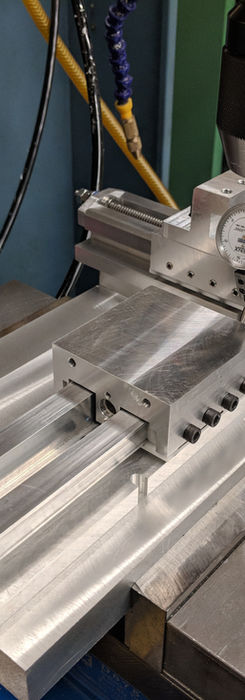
T-Base Lathe
As a final deliverable for course 2.77 - FUNdaMENTALS of Precision Machine Design, I designed, built, and tested a T-Base Lathe. Unlike conventional lathes, a T-Base Lathe does not have one axis stacked on the other. As a result, it is better arrangement for precisely facing surfaces. My lathe was capable of providing a maximum surface variation of 13 um (peak-to-peak), measured on a 200 um cut.
The T-Base Lathe was sequentially designed and built, starting with the one linear-motion axis, then duplicating that axis, adding the rotary lead screw motion, and then completing an error model of the full lathe, before finally assembling the components on a base-plate, and testing.
Collaborators:
Contributions:
Modeling, Design, Manufacturing, and Testing









